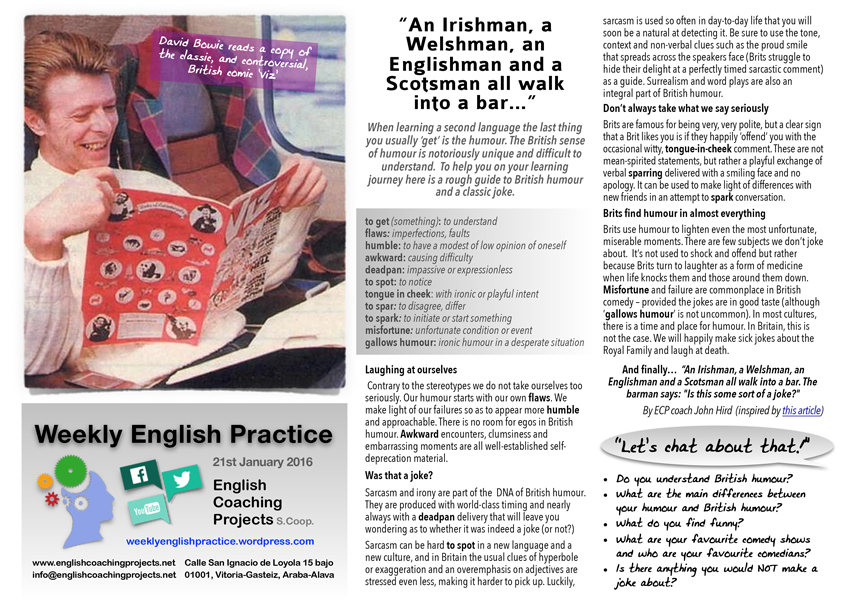Click on the image to download the pdf
When learning a second language the last thing you usually ‘get’ is the humour. The British sense of humour is notoriously unique and difficult to understand. To help you on your learning journey here is a rough guide to British humour and a classic joke.
Vocabulary. Read and check you understand this before you read and listen to the article:
to get (something): to understand
flaws: imperfections, faults
humble: to have a modest of low opinion of oneself
awkward: causing difficulty
deadpan: impassive or expressionless
to spot: to notice
tongue in cheek: with ironic or playful intent
to spar: to disagree, differ
to spark: to initiate or start something
misfortune: unfortunate condition or event
gallows humour: ironic humour in a desperate situation
Laughing at ourselves
Contrary to the stereotypes we do not take ourselves too seriously. Our humour starts with our own flaws. We make light of our failures so as to appear more humble and approachable. There is no room for egos in British humour. Awkward encounters, clumsiness and embarrassing moments are all well-established self-deprecation material.
Was that a joke?
Sarcasm and irony are part of the DNA of British humour. They are produced with world-class timing and nearly always with a deadpan delivery that will leave you wondering as to whether it was indeed a joke (or not?)
Sarcasm can be hard to spot in a new language and a new culture, and in Britain the usual clues of hyperbole or exaggeration and an overemphasis on adjectives are stressed even less, making it harder to pick up. Luckily, sarcasm is used so often in day-to-day life that you will soon be a natural at detecting it. Be sure to use the tone, context and non-verbal clues such as the proud smile that spreads across the speakers face (Brits struggle to hide their delight at a perfectly timed sarcastic comment) as a guide. Surrealism and word plays are also an integral part of British humour.
Don’t always take what we say seriously
Brits are famous for being very, very polite, but a clear sign that a Brit likes you is if they happily ‘offend’ you with the occasional witty, tongue-in-cheek comment. These are not mean-spirited statements, but rather a playful exchange of verbal sparring delivered with a smiling face and no apology. It can be used to make light of differences with new friends in an attempt to spark conversation.
Brits find humour in almost everything
Brits use humour to lighten even the most unfortunate, miserable moments. There are few subjects we don’t joke about. It’s not used to shock and offend but rather because Brits turn to laughter as a form of medicine when life knocks them and those around them down. Misfortune and failure are commonplace in British comedy – provided the jokes are in good taste (although ‘gallows humour’ is not uncommon). In most cultures, there is a time and place for humour. In Britain, this is not the case. We will happily make sick jokes about the Royal Family and laugh at death.
And finally… “An Irishman, a Welshman, an Englishman and a Scotsman all walk into a bar. The barman says: “Is this some sort of a joke?”
By ECP coach John Hird (inspired by this article)
“Let’s chat about that!”
- Do you understand British humour?
- What are the main differences between your humour and British humour?
- What do you find funny?
- What are your favourite comedy shows and who are your favourite comedians?
- Is there anything you would NOT make a joke about?
Write your answers and send them by email to your ECP coach. Why not record your voice too? Listen to yourself speak and identify what you have to improve on 🙂


